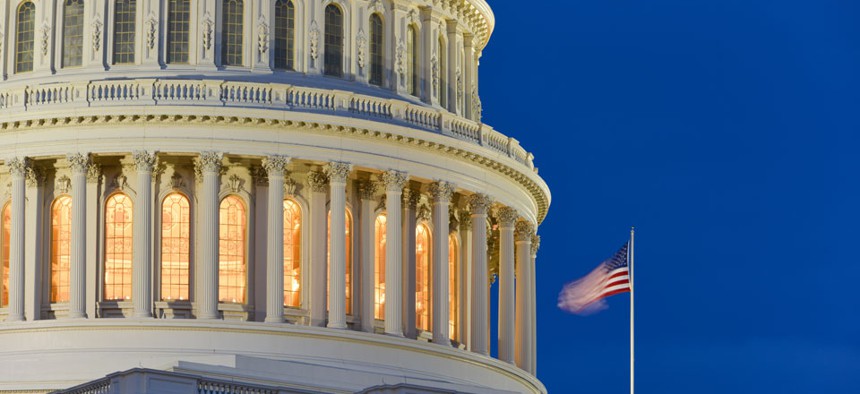
Orhan Cam/Shutterstock.com
Senate on the Brink of 'Nuclear' War Over Nominations
Labor and EPA nominees are among those still awaiting confirmation.
Another round of brinkmanship over political appointments is under way in the Senate, with Majority Leader Harry Reid, D-Nev., once again putting his finger squarely on the button of the "nuclear option" viewed with horror by Republicans.
Reid set the Senate on a path Thursday toward changing Senate rules so that only a simple majority is needed to clear executive nominations. After a day filled with sound bites and melodrama, Reid filed motions to end debate on seven nominations, including those of Thomas Perez as Labor secretary and Gina McCarthy to head the Environmental Protection Agency, which have been held up for weeks by GOP objections.
A vote on the first cloture motion -- to end debate on the nomination of Richard Cordray as director of the Consumer Financial Protection Bureau, a post he already holds by virtue of a recess appointment from President Obama -- is expected Tuesday. If the cloture motion fails to get 60 votes, Reid promises to use the so-called nuclear option to bring the other nominations to the Senate floor for simple majority votes.
Before the formal session on Tuesday, however, the Senate will gather at 6 p.m. Monday for a rare, informal meeting in the Old Senate Chamber to hash out differences on Senate rules and confirmation procedures. An exasperated Sen. Roger Wicker, R-Miss., suggested the meeting Thursday after Reid telegraphed his intentions to go nuclear on the floor.
The theater began early in the day when Reid took to the floor and railed against Minority Leader Mitch McConnell, R-Ky., who recently charged that Reid was about to break an agreement not to change the rules allowing senators to filibuster nominations. Charging that Republicans are obstructing the president's nominees, Reid argued that the GOP had turned the "advise and consent" role of the Senate into "deny and obstruct." McConnell, Reid said, had broken his part of the agreement by allowing nominations to be blocked. Nearly two dozen Republican senators arrived to watch Reid and McConnell spar.
McConnell charged that Reid was threatening to undo the rules of the Senate and that for Reid "advise and consent means sit down and shut up." Sen. Lamar Alexander, R-Tenn., pointed out that Reid risked harming his own party if Democrats find themselves in the minority one day, and Sen. Bob Corker, R-Tenn., suggested there was dissension in the Democratic ranks—Corker said he had talked to members of Reid's party who did not understand the reason for the rules change.
But many Democrats appeared to back their leader's effort to dislodge long-delayed nominations. "The threats always seem to move things," said Sen. Tom Udall, D-N.M., one of the leading proponents of the nuclear option. "But the important thing is for us to get caught up to a reasonable level and I don't know that we're gonna do that."
Asked how he would respond if Republicans vote to clear the controversial nominees, Reid said, "Hallelujah." Then asked whether he would go forward with the nuclear option, Reid backed off. "If they do, why would we have to do that?"
Sen. Chuck Schumer, D-N.Y., standing nearby, signaled his agreement. Other members of Democratic leadership stood in support of Reid as well, including Sen. Patty Murray, D-Wash., and Majority Whip Dick Durbin, D-Ill.
There was not unanimous support among Democrats, though. Before heading into a caucus meeting, Sen. Carl Levin, D-Mich., registered his concerns. "I oppose using nuclear options to change the rules," he said. "The question is whether or not the majority can change the rule when the rules provide that it takes two-thirds to change them. That's the issue. It's been fought over for decades."
To say Republicans are angry about the idea would be an understatement. Democrats, they argue, should forget about worrying about being in the minority one day. If they go nuclear, it will be even more difficult to come to any kind of agreement in the Senate.
"If the nuclear option is opted, there won't be any later agreements," Sen. Pat Roberts, R-Kan., said.
The nominees besides Cordray, Perez, and McCarthy who've been placed on the Senate's calendar are National Labor Relations Board nominees Richard Griffin, Mark Pearce, and Sharon Block, plus Fred Hochberg to be president of the Export-Import Bank.







